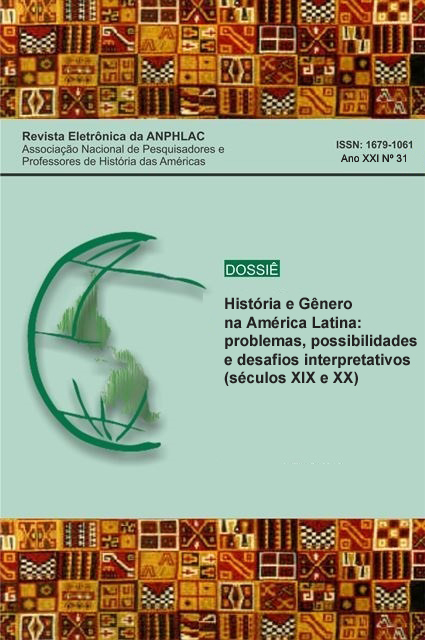(Re)pensando a Unidade Popular: Estado, Trabalho e Gênero na “vía chilena ao socialismo” (1970-1973)
.
DOI:
https://doi.org/10.46752/anphlac.31.2021.4026Palavras-chave:
Chile, estado, relações de trabalho, gênero, via chilena ao socialismo.Resumo
O presente artigo trata das interações entre políticas sociais, trabalho e gênero na Unidade Popular (UP), coalizão de esquerda que governou o Chile entre 1970-1973. O objetivo é fazer alguns apontamentos sobre como as desigualdades de gênero foram entendidas e tratadas na transição ao socialismo e, em que medida, integraram as políticas de governo da UP e as dinâmicas das fábricas têxteis, setor produtivo que teve um importante protagonismo no período. Dessa forma, buscamos compreender como as normas de gênero se estabeleceram e/ou persistiram e como foram reproduzidas, confrontadas e tensionadas no período, de modo a evidenciar aspectos das complexas interações entre, o Estado, setores das classes trabalhadoras, as formas e mecanismos de dominação e opressão no capitalismo e os processos pautados na reconfiguração radical da sociabilidade capitalista. No período, o ímpeto transformador coexistiu com uma moral tradicional e heteronormativa que se manifestou de diversas formas, inclusive no interior das esquerdas e organizações de trabalhadores, provocando tensionamentos, mas também atualizações dos poderes normativos, desvelando os desafios envolvidos na transformação das estruturas opressivas.
Downloads
Referências
Referências Bibliográficas
Allende a 50 años de su elección. Discursos Fundamentales. Santiago: Biblioteca del Congreso Nacional de Chile, 2020.
AUSTIN HENRY, Robert; VASCONCELOS, Joana Salém; RAMÍREZ, Viviana Canibilo (orgs.). La vía chilena al socialismo: 50 años despúes. Buenos Aires: CLACSO, 2020.
BARR-MELEJ, Patrick. Siloísmo and the self in Allende’Chile: Youth, Counterculture and Politics on the Road to Socialism and Dictatorship. Hispanic American History Review, n.46, p.747-784.
BRAVO, Rosa, GALVEZ, Thelma. Siete décadas de registro del trabajo feminino, 1854-1920. Revista Estadística y Economia. Instituto Nacional de Estadistica, n.5, dez. 1995.
CAVE, Rose (coord.). Brasil y Chile: una mirada hacia América Latina y sus perspectivas. RIL Editores: Santiago do Chile,2006.
COSTA, Adriane V.; BORGES, Elisa C. (Orgs). “Os 50 anos da Unidade Popular no Chile: um balanço historiográfico. Fino Traço: Belo Horizonte, 2020.
DEUSTCH, Sandra Mcgee. Gender and sociopolitical change in twentieth-century Latin America. The Hispanic American Historical Review. Vol. 71, n.2, maio de 1991.
DUCCI, Angélica; GILI, Margarita; ILLANES, Marta. El trabajo: um nuevo destino para la mujer chilena? Instituto Laboral y del Desarrollo Social, 1972.
FERGUSON, Susan; MCNALLY, David. Capital, força de trabalho e relações de gênero. Revista Outubro, n.29, novembro de 2017, p.23-59.
FONTES, Virgínia. O Brasil e o capital-imperialismo: teoria e história. Rio de Janeiro: Escola Politécnica de Saúde de São Joaquim Venâncio, Universidade Federal do Rio de Janeiro, 2010.
HALL, Stuart. A identidade cultural na Pós-Modernidade. DP&A Editora: Rio de Janeiro, 2006, p.45.
HUTCHISON, Elizabeth Quay. Labors appropriate to their sex: gender, larbor and politics in urban Chile, 1900-1930. Durham: Duke Unuversity Press, 2001.
GARCÉS, Mario. ......IN: Fiesta y drama. Nuevas historias de la Unidad Popular. Santiago: Lom Edicciones, 2014.
GARRETÓN, Manuel A. La vía chilena al socialismo. Esperanza, fracasso y derrota de um proyecto político. Documento de Trabajo. FLACSO. Série Estudios Políticos N.32, Santiago, outubro de 1993.
GARCÉS, Joan. Allende e as armas da politica. São Paulo: Scritta Editorial, 1993.
GREZ TOSO, Sérgio. “Escribir la historia de los sectores populares. Con o sin la politica incluída? A proposito de dos miradas a la historia social”. Politica, vol. 44, Universidade do Chile,2005.
GAUDICHAUD, Franck. Poder Popular y cordones industriales: testimonios sobre el movimiento popular urbano, 1970-1973. Lom Ediciones: Santiago, 2004.
ILLANES, Maria A. La batalla de la memoria. Santiago: Planeta/Ariel, 2002.
MAURO, A.; GODOY, L.; DÍAZ, X. (2009). Trabajo y empleo femenino en Chile 1880-2000. Su aporte al desarrollo del país desde la economía doméstica, el trabajo voluntario y el trabajo remunerado. Santiago de Chile: Centro de Estudios de la Mujer CEM, pp. 357-358.
MOULIÁN, Tomas. La forja de ilusiones. El sistema de partidos (1932-1973). Santiago do Chile: Universidade ARCIS/FLACSO, 1993.
PINTO VALLEJOS, Julio. Cuando Hicimos História: la experiencia de la Unidad Popular. Santiago: LOM Ediciones, 2005.
PINTO VALLEJOS, Julio (Org.).Fiesta y drama. Nuevas historias de la Unidad Popular. San-tiago: Lom Edicciones, 2014.
POWER, Margareth. La mujer de derecha. El Poder Feminino y la lucha contra Salvador Allende, 1964-1973. Santiago: Centro de Investigaciones Diego Barros Arana, 2008.
POWER, Margaret. “La Unidad Popular y la masculinidad”. La Ventana, n. 6, 1997. Tradução Moisés Silva.
POWER, Margareth. La mujer de derecha. El Poder Feminino y la lucha contra Salvador Allende, 1964-1973. Santiago: Centro de Investigaciones Diego Barros Arana, 2008.
SHAYNE, Julie D. The revolution question. Feminism in El Salvador, Chile and Cuba. Rutgers University Press: New Jersey, 2004.
TINSMAN, Heidi. La tierra para el que trabaja: género, sexualidad y movimentos campesinos em la reforma agraria chilena. Santiago do Chile: LOM Ediciones, 2009.
WAYLEN, Georgina. Rethinking women’n political participacion ans protest: Chile 1970-1990. Political Studies, 1992, 299-314.
WINN, Peter. Tejedores de la Revolución: Los Trabajadores de Yarur y la via chilena al socialismo. Santiago: LOM, 2004.
ZÁRATE CAMPOS, María S.; MOYA GONZALEZ, Maricela. Planificación familiar en la guerra fría chilena: politica sanitária y cooperación internacional 1960-1970. Historia Critica, n.55, Bogotá, jan.-mar. de 2015, p.207-230.
Downloads
Publicado
Como Citar
Edição
Seção
Licença
a. Cessão de direitos autorais
Venho, por meio desta, ceder em caráter definitivo os direitos autorais do artigo "____________", de minha autoria, à Revista Eletrônica da ANPHLAC e afirmo estar ciente de que estou sujeito às penalidades da Lei de Direitos Autorais (Nº9609, de 19/02/98) no caso de sua infração. Autorizo a Revista Eletrônica da ANPHLAC a publicar a referida colaboração em meio digital, sem implicância de pagamento de direitosautorais ou taxas aos autores.
b. Declaração de ineditismo e autoria
Atesto que o artigo ora submetido à Revista Eletrônica da ANPHLAC, intitulado "________________________", de minha autoria, nunca foi publicado anteriormente, na íntegra ou em partes, dentro do país. Vindo a ser publicado na Revista Eletrônica da ANPHLAC, comprometo-me a não republicá-lo em qualquer outro veículo editorial.






